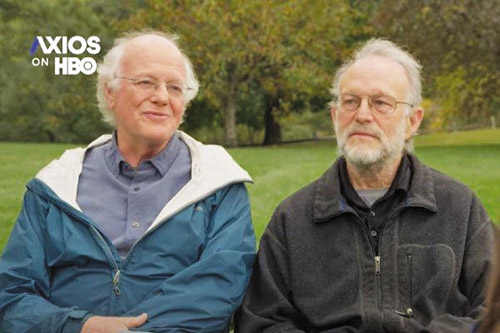
One weak point of the BDS movement is that in a world of so much injustice, it singles out Israel for boycotts. When asked about boycotts, divestments and sanctions against, say, China for its treatment of Chinese Uighurs, the standard BDS answer is either “You have to start somewhere,” meaning Israel, or explaining why the Jewish state is allegedly so far beyond the pale that it deserves to be singled out.
Neither reply stands up to scrutiny.
So when Ben Cohen and Jerry Greenfield sat down with Axios to discuss the Ben & Jerry’s boycott of Judea and Samaria, the two found themselves melting in the face of one particular question. Cohen opened the door by first telling reporter Alexi McCammond that he disagreed with certain U.S. policies.
“We couldn’t stop selling in the U.S,” he said, with a disdainful shrug.
He added, “I think it’s fine to be involved in a country, and be a citizen of the country, and to protest some of the country’s actions. And that’s essentially what we’re doing in terms of Israel. We hugely support Israel’s right to exist, but we are against a particular policy.”
That led to the question that stumped Cohen.
“You guys are big proponents of voting rights. Why do you still sell ice cream in Georgia? Texas — abortion bans. Why are you still selling there?” McCammond asked.
Cohen sat there quietly, awkwardly shrugged his shoulder before finally admitting, “I don’t know.” After a nervous laugh, he said, “It’s an interesting question. I don’t know what that would accomplish. We’re working on those issues, of voting rights and,” and then his voice trailed off.
Another awkward shrug.
“I think you ask a really good question. And I think I’d have to sit down and think about it for a bit.”
But McCammond continued pressing Cohen.
“Every woman who lives in Texas now is going to have an impossible time getting an abortion. If you’re a woman who lives in Texas, you now have been stripped of those rights because of the Texas government.”
To which Cohen replied, “By that reasoning, we should not sell any ice cream anywhere. I’ve got issues with what’s being done in most every state and most every country.”
Fortunately for Cohen, Greenfield found his voice.
“I think that one [thing] that’s different is that what Israel is doing is considered illegal by international law. So I think that’s a consideration,” Greenfield said.
(In fact, Greenfield’s claim is inaccurate. Perhaps his knowledge of Zionist history is limited, particularly with regard to the pivotal 1920 San Remo conference, which provided exclusive legal and political rights in “Palestine” to the Jews, including the biblical homeland of Judea and Samaria.)
It’s been 20 years since the Durban Conference, a key moment in the birth of the BDS movement. Even if “you have to start somewhere,” it’s clear that BDS isn’t interested in tackling human rights issues anywhere else in the world unless they can be co-opted to the Palestinian movement. That’s why BDS leaders have never talked about Russia’s illegal annexation of Crimea or Iran’s practice of taking hostages.
Nor can BDS leaders plausibly claim that Israel is unique anathema in a world dealing with China’s genocide of the Uighurs and fallout from Myanmar’s Rohingya genocide, among other atrocities.
By becoming fellow travelers to BDS, Cohen and Greenfield have created a new political taste-test that will raise questions about ice cream sales in plenty of other places with political controversies.













